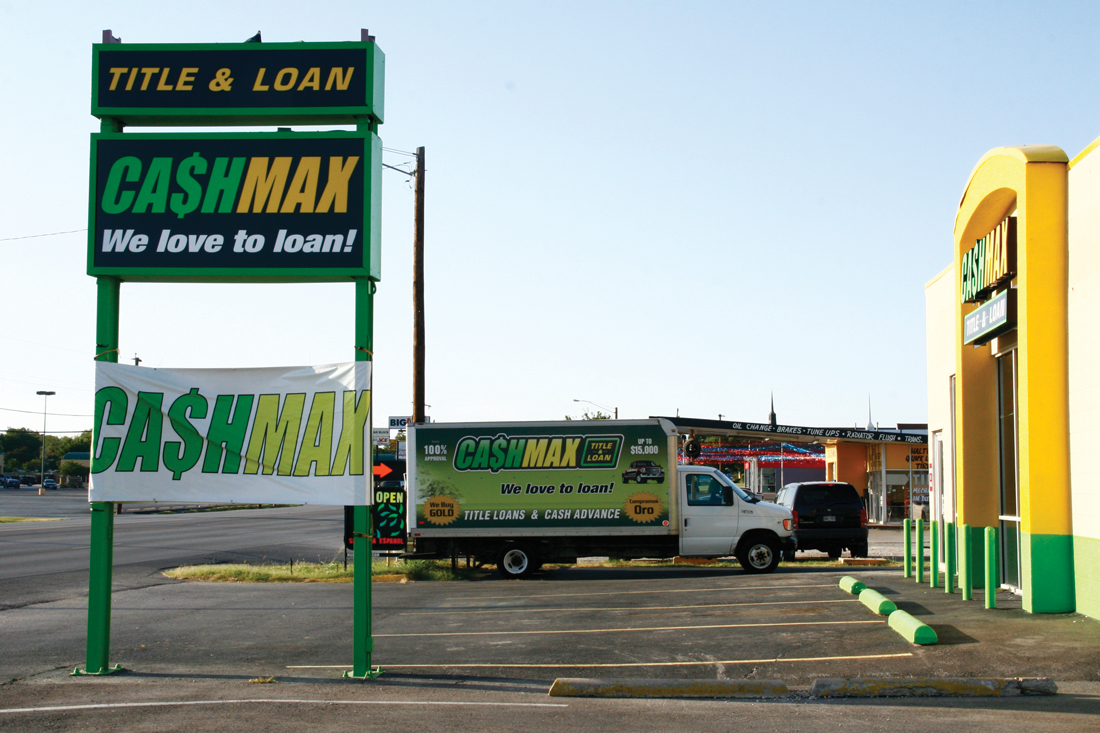Rachel was talking to her Sunday school class in Haltom City a few weeks before Christmas. Her voice broke, and she started crying.
“We have to take our son’s gifts back to Wal-Mart,” she said.
Rachel, 29, works part time at a daycare center and is a full-time college student. She asked that only her first name be used because she’s embarrassed about financial decisions she made last year. Her husband works two jobs to support them and their young son.
In August, Rachel’s mother-in-law died unexpectedly. The couple didn’t have enough money to cover the cost of the funeral, so they borrowed as much as they could from family and friends. At the end of the month, they were short on money to pay bills.
“It all started with one $800 loan” from a payday lender, said Rachel. “Then we took out two other loans to pay for the original.”
By the time December rolled around, Rachel and her husband owed $2,200 to payday lenders — companies that make short-term loans with interest rates as high as 500 percent and no option of paying down the loan in installments.
Unlike banks, which have interest rates capped at 18 percent, payday and auto title lenders operate in a gray zone of the law as “credit access businesses” or CABs.
In Haltom City, which is home to 16 short-term lenders, Rachel’s church (where I also attend) doesn’t have a program in place to educate community members about the pitfalls of payday and auto title lending. But many faith-based organizations are pushing for tighter restrictions and new lending alternatives.
The Texas Faith for Fair Lending Coalition is trying to show a correlation between a high density of payday lenders in a community and poor community health. The organization just received a $200,000 grant from the Robert Wood Johnson Foundation’s Roadmaps to Health program for further research into the link between payday lending and the health status of Texas communities. The coalition, composed of the Texas Interfaith Center for Public Policy, the Texas Catholic Conference, and the Christian Life Commission of the Baptist General Convention of Texas, represents more than 20,000 Texans.
The grant will also go toward designing new ideas and policies aimed at regulating short-term lending, as well as improving public education on the issue, explained Bee Moorhead, executive director of Texas Interfaith Center for Public Policy. But the main focus will be collecting hard data that compares the prevalence of payday lenders with the health of the communities in which they operate.
“The presence of a payday lender doesn’t make people sick,” said Moorhead. “But it contributes to a cultural environment that does.”
She offered a comparison between El Paso and Collin counties as an example. El Paso ranks 162nd in health status out of Texas’ 254 counties and has one payday lender for every 6,000 residents. Collin County, on the other hand, ranks 20th in health status and has one payday lender for every 11,000 residents. A county’s health status involves factors such as premature death rates, physical and mental health indicators, and infant birth weights.
“It’s just ridiculous on its face … that some organization would come out with that data,” said Julie Hillrichs, vice president of Vianovo, the company that handles public relations for the Consumer Service Alliance of Texas, a trade organization representing state payday loan and auto title lenders.
“What about the number of McDonalds? How about the lack of churches?” she said. Those could just as easily contribute to a community’s health status, she argued.
Stephen Reeves, legislative counsel with the Christian Life Commission, said many factors affect the health of a community, including economic stress. “And there’s a direct correlation between medical expenses and payday lending,” he said. “Payday lenders are even advertising their services by placing fliers on cars in hospital parking lots.”
“I would have to draw a distinction between correlation and causation,” said Rob Norcross, spokesperson for the Consumer Service Alliance. “There are a lot of other factors that go into health status that are more determinant than consumer credit.” Norcross said he believes that a community’s average income, availability of good jobs, and pollution levels are more important health indicators.
When you look at a map of where payday and auto title lenders congregate, it’s in low-income neighborhoods, Reeves said. According to the U.S. Census Bureau, El Paso County has a median household income of just over $38,000, with 25 percent of the population living below the poverty line. Comparatively, Collin County has a household income of $82,000, with just 7 percent of its residents living in poverty.
Is the prevalence of payday lenders making people sick, asked Moorhead? “Or, are payday lenders making people poor and being poor is making people sick?”
In 2011, the Texas Legislature passed two bills to restrict the payday loan industry. The state now requires all payday and auto title lenders to register with the Office of Consumer Credit Commissioner (OCCC) and to post rates and fees inside their stores. During that same legislative session, some politicians — including State Sen. Wendy Davis of Fort Worth — tried unsuccessfully to pass legislation to cap interest rates and fees charged by lenders. Faith-based groups point to this “cycle of debt” as the most harmful part of the industry’s business model.
Hillrichs said the payday loan industry has addressed the issue voluntarily. “Best-practice” guidelines went into effect in November that include an “extended payment plan” with no fees for late payments, plus limits on transaction fees and the option to pay down a portion of the principal on auto loans each time a loan is refinanced. The group’s members, representing 85 percent of payday and auto title lenders in the state, voted overwhelmingly for the limits, she said.
But Moorhead and Reeves argue that statewide legal restrictions are necessary.
That’s something that the legislature is currently addressing, spearheaded by Davis and others.
“I will continue to fight for meaningful reform in the payday and auto title lending industry to stop the cycle of debt they inflict on thousands of Texas families,” Davis said in a statement. “This session, I intend to file legislation to close loopholes that the industry continues to use to exploit Texans and hurt our economy.”
New data from the OCCC show that 70 percent of short-term borrowers couldn’t repay their loans the first time they came due, usually after a two-week period, Reeves explained. And nearly half of borrowers had to roll over the loan at least twice. Rolling over loans quickly adds up to big money.
In Texas, the average fee per $100 loan is $23. For a $300 loan that’s $69 in fees. If it’s renewed three times, it adds up to a $207 fee, with zero paid on the principal.
“A significant number of people are rolling over these loans six, seven, eight, and nine times — you can see how devastating these loans can be,” said Reeves.
State data also show an average of 92 cars per day are being repossessed by auto title lenders in Texas. The cars were pledged as equity by borrowers who couldn’t make the payments.
“In Texas, a car is your livelihood,” said Reeves. “If you don’t have a car, you’re going to have a hard time going to work.” And if you can’t get to work, you can’t make money to repay your loan.
Rachel was able to pay off her loan in full by January, with help from her family.
“I will never do it again,” she said. “These lenders take advantage of young families. People don’t realize that there are other ways to get the money you need.”













These type of loans should be illegal everywhere. The poor are the ones that use these loans because it is quick and they don’t have the credit to get a regular loan, but the interest rates are just too high. I know that some people who take these loans have no intention of paying them back, or sign over a title to a car that is worthless.
People need to stop living on credit and actually build wealth, not debt.
Have you ever been in the scenario described above? I feel you wrote this from private expertise?
Am I proper? I seriously enjoyed reading your perform.
Can we do a guest blog?
Wow that was strange. I just wrote an extremely long comment but after I clicked submit my comment didn’t
appear. Grrrr… well I’m not writing all that over again.
Anyhow, just wanted to say excellent blog!
I read this article fully on the topic of
the resemblance of latest and previous technologies, it’s awesome article.